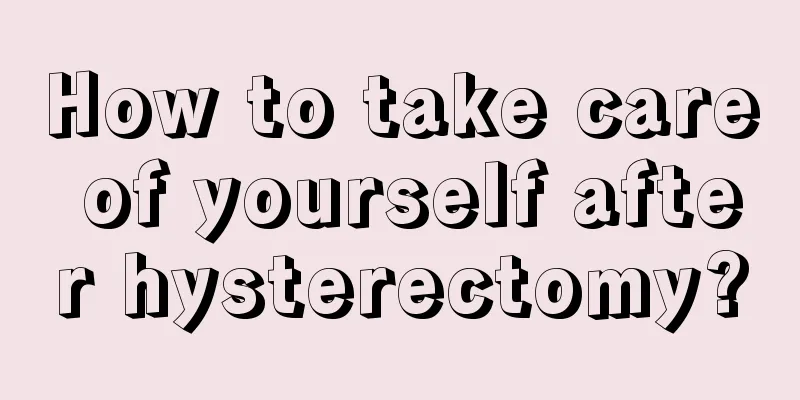How to take care of yourself after hysterectomy?

|
It is understood that in recent years, uterine fibroids have become increasingly common in younger people, which may be related to work pressure and dietary health in modern society. Traditional Chinese medicine says that uterine fibroids are a type of symptom, which is related to physical weakness, blood deficiency, qi deficiency, and emotional disorders. Therefore, we must focus on these aspects of care after a hysterectomy. So how should we care after a hysterectomy? How to adjust after hysterectomy: Patients who have undergone total hysterectomy generally rest in bed within one week after surgery, but they should avoid lying in bed for long periods of time. Patients can get out of bed and move around as appropriate based on their own recovery, because early postoperative activity can promote early recovery of gastrointestinal function and reduce the occurrence of postoperative complications such as intestinal adhesions. Patients can engage in appropriate outdoor activities one week after surgery, paying attention to the combination of work and rest. In addition to the need to recover from the abdominal incision, patients who have undergone total hysterectomy should also prevent the sutures at the top of the vaginal incision from falling off and causing vaginal bleeding. They should avoid carrying weight, squatting, and physical labor too early within one month after the operation. Pay attention to psychological adjustments: Maintain a happy, cheerful and optimistic mood. After a total hysterectomy, some women will worry about whether they will age after the hysterectomy. In fact, female characteristics are maintained by the secretion of estrogen by the ovaries. The uterus is only one of the important organs for nurturing the fetus. When the patient has no fertility requirements, only the uterus is removed due to the disease, and the ovaries are retained. The normal physiological function of women can still be maintained and will not accelerate aging. Nutrition should be strengthened after surgery: Eat more foods containing protein, vitamins and iron to promote the healing of the incision. Pay attention to adequate water intake every day, eat more vegetables, fruits and high-fiber foods, keep bowel movements smooth, and prevent vaginal stump bleeding caused by excessive abdominal pressure due to constipation. This article comprehensively introduces some nursing care matters after hysterectomy, mainly physical care, psychological care, and dietary care. I hope it can help the patient's family. Usually, after a hysterectomy, patients not only have to endure physical pain, but also suffer some psychological pressure. It is recommended that the patient's family and friends give the patient more patience and love. |
<<: What should I pay attention to after my hysterectomy?
>>: How to take care of yourself after hysterectomy?
Recommend
Moxibustion for vaginitis
Moxibustion has a certain auxiliary effect on vag...
Labiaplasty
The vulva is an important part of the female repr...
Seize the golden growth period in spring and pay attention to these 3 misunderstandings that affect children's height growth!
Source: People's Daily, Guangdong Centers for...
Can pregnant women eat mutton?
In fact, women can eat mutton after giving birth,...
What causes nosebleeds during menstruation?
Women have their menstrual period for a few days ...
How is miscarriage caused?
Inevitable miscarriage is a common miscarriage in...
What is the meaning of the Analects? How is the argumentation style of the Analects different from that of Mencius?
Since the Song Dynasty, The Analects has been lis...
How long does it take to get pregnant after taking abortion pills?
Abortion can be divided into many types. In fact,...
An internationally recognized type of carcinogenic food, many families eat it for three meals a day!
Singer Fu Song died of oral cancer at a young age...
[National Cancer Prevention and Treatment Week] Breast nodules and breast hyperplasia
Why do women develop breast nodules? In short, br...
The reason why you can't go to someone else's house when you have a miscarriage
Female miscarriage is a very painful thing, which...
How much does Down's syndrome test cost?
Generally, pregnant mothers only know that prenat...
What to do if a girl can't walk
Generally speaking, girls' physique is worse ...
The best time to drink brown sugar water during menstruation
There is a saying: "Every girl who suffers f...









